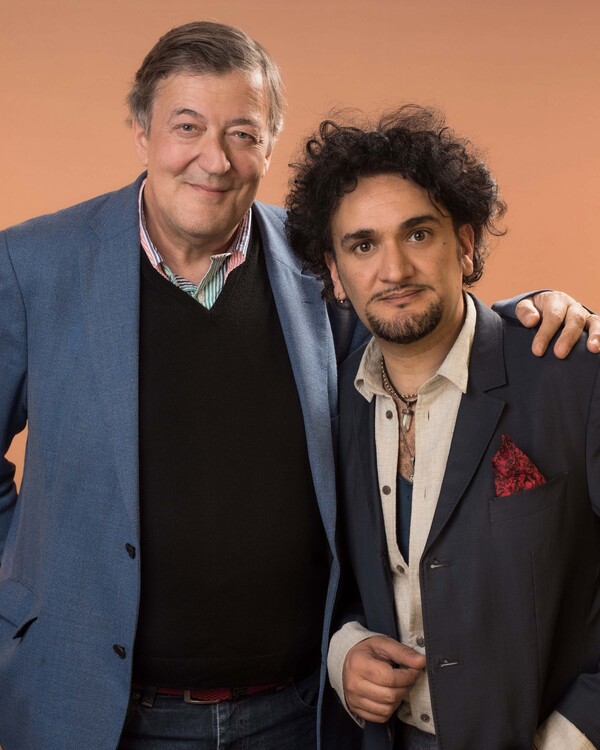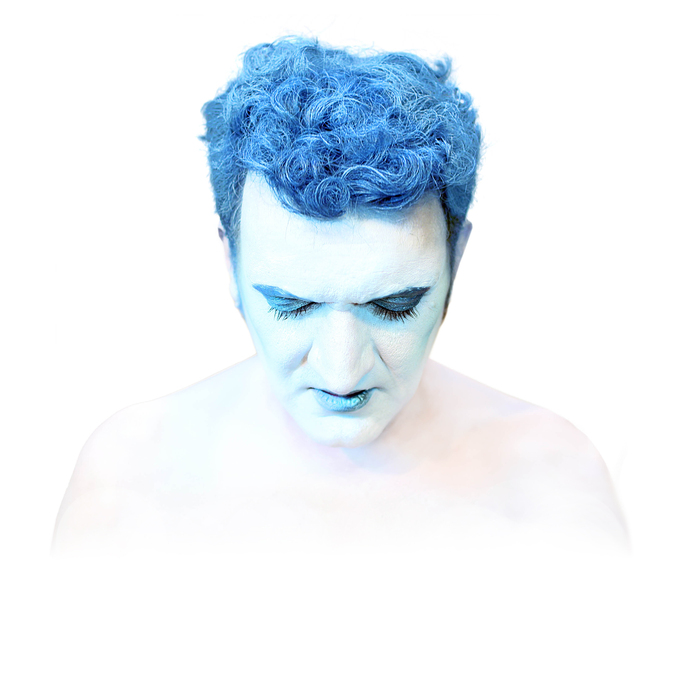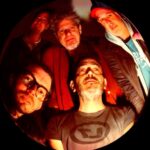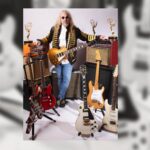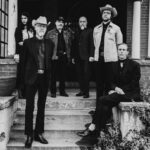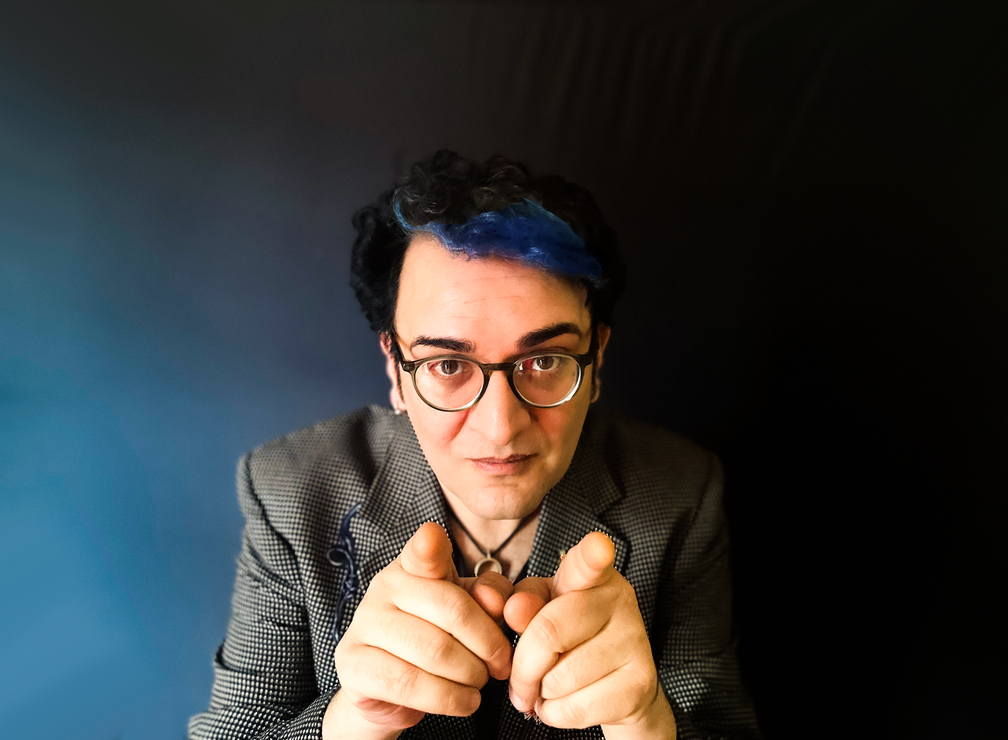
Tim Arnold (Credit: Tim Arnold Music)
Tim Arnold is a singer-songwriter set to release his upcoming album Super Connected, which explores the timely and important topics of social media, big tech, and mental health. In this interview, Tim speaks to Jason Barnard about the inspiration behind the album and how his personal experiences with autism influenced its creation. We will also discuss his collaborative process of working with Kevin Godley, Lindsay Kemp and Stephen Fry.
Can you tell us more about the concept behind your upcoming album Super Connected? How did you come up with the idea and what inspired you to explore its themes?
I have a friend in Italy who works as a neuropsychotherapist. During my stay with him, he explained to me that his work involved counselling teenagers who live at home with their parents but had dropped out of society. These were youngsters who refused to go to school and stayed in bed all day, connecting with the outside world only via apps and social media.
The image of a young person at the start of their life, isolated and only connecting with others remotely both fascinated and disturbed me. But it also resonated with me. I began writing the title song of Super Connected in that character when I returned to the UK. The electronic beep of the main motif in the title track came from me playing out a scene of someone tapping their phone as if they were tapping on a stranger’s window. I’ve read that Super Connected is my most accessible album. But the creative process was the most experimental of all my albums.
I was forced to explore embodiment to write about our disembodied world. I learnt a lot about that when I lived in the monastery in Thailand. My first album ‘Lokutara’ was made with a technique they taught me that uses patterns in nature. Several of the songs from that record came from the lines I traced from the stones at Stonehenge. Music is in everything. We just need to reveal it.
When exploring the topic of big tech and mental health in his album, what kind of research did you undertake?
I worked as an Apple Specialist in 2010 and did the 3-week intensive Apple Core Training programme at Freemason’s Hall in Covent Garden. I wasn’t aware of it at the time, but that was an unplanned, intense research and downloading of material for Super Connected.
Although I wouldn’t be diagnosed with my neurodivergent condition for another 12 years, I was completely at odds with the protocols that were taught to us during my Apple apprenticeship. As creative tools, Apple products have been an important part of my creative process for over 25 years. But the competitive drive that I was very naïve about when I worked there, was something I found deeply shocking and upsetting.
It felt to me, like we were being taught to manipulate customers and make them dependent on the products and services that were being offered. All my fellow employees seemed to comply. Of course, I was one of the older ones and less malleable I suppose. It made me cry when I would get home after work. It felt like I was the only one that could see the horror. The entire experience made me feel duplicitous and ashamed of myself. The falsification of relationships that were referred to as ‘interactions’ really did signal the start of the new ‘faux authenticity’ that has become normal these days for corporations.
If it happened today, I don’t think anyone else would bat an eyelid. The sophistication of advertising and data colonialism is fairly standard now. But I could not accept it and still can’t, so of course I began to connect with customers in a way that would actually help them master their use of whatever product they bought. My original application to Apple included information about me teaching Buddhist monks in a Thai monastery on how to use Apple computers and Logic Pro (which I did in 2004). That’s why I thought I had been hired by Apple.
I was asked to leave Apple after six months and told by the store manager in our last meeting that I was “helping the customers too much”. He said “I was not giving the customer an incentive to make a strong ‘connection’ with the Apple family”.
Side Two of Super Connected could not have been written by a musician who never worked at Apple. Not that it’s my choice, but it’s interesting that Apple is the only platform where you can’t get the album.
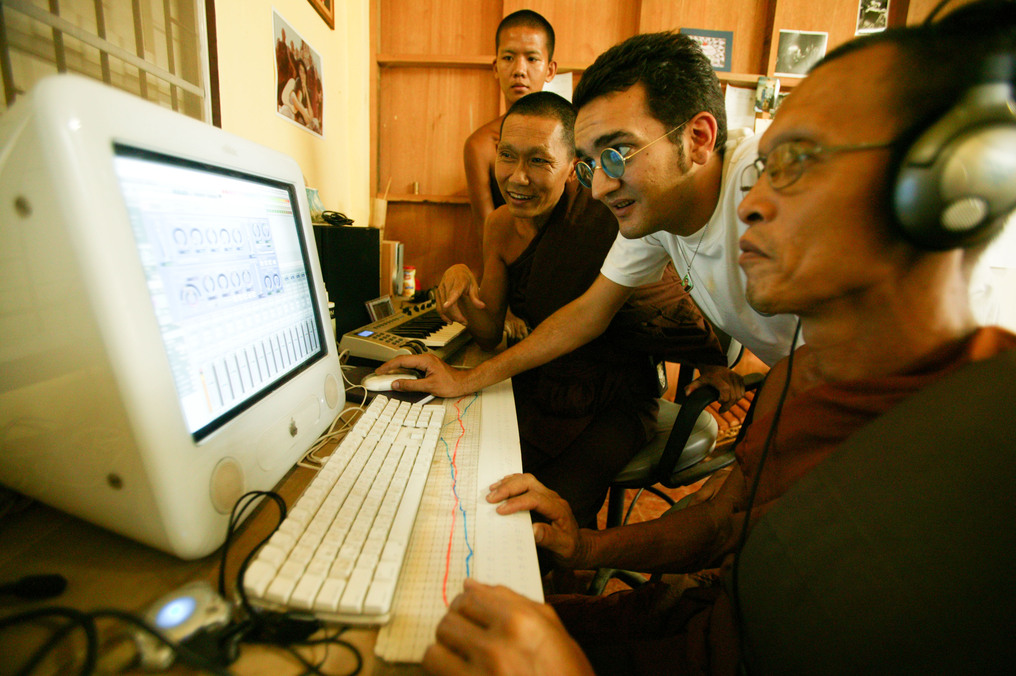
We know that your album is a mix of various genres, can you give us a taste of what to expect in terms of musical style and sound?
History and archiving has been a lifelong passion. I do collect things, in life, but also in music. So there’s many genres on the album. A lot from my childhood – 80s electro and bombastic angular pop. There’s also a lot of 90’s guitar influence which is where I started with my first band Jocasta. Piano balladry that wouldn’t sound out of a place on a Kate Bush record. Occasional early 70’s Bowie rock posturing and Michael Nyman-esque string patterning. I also created a bank of my own sampled instruments with sounds derived from our day to day electronic world. Bank machines and phone notifications. I wanted to use sounds that are used by big tech companies to trigger dopamine. But I wanted to use those sounds melodically, alongside lyrics that are about companies using those sounds to trigger dopamine.
I also do sing in many different characters, both lyrically and vocally, so my family’s theatrical background is also at large. Some songs are actually sung in my voice, but a lot of them are sung in multiple characters on each song. For example, The Complete Solution is actually a duet between a customer and a salesman in a ‘tech’ store. We live in the conflict of wanting both the slow lane of Zen and the fast lane of growth that technology promises to give us. With The Complete Solution, I wanted to make a song that sounded like that conflict, so I sang both characters to create the song, but also to experience that conflict.
Super Connected is basically the first album I’ve made that includes all the genres of music that I love listening to myself.
How did the unexpected diagnosis of autism affect the making of the album, both personally and creatively? Did it change your approach to the project in any way?
Being diagnosed with autism has completely changed the way I look at the album, and all my albums for that matter. I’ve often not understood a lot of my song lyrics or where they came from, particularly the songs I’ve written that deeply move people. Listening to them post-diagnosis makes more sense though. I’ve been looking for something in my music. And my music has been trying to help me find it. On Super Connected, we finally started looking together.
Super Connected began in 2016. It started with me writing songs in character, as if I had a serious condition that made communication difficult for me. I approached the song writing like a method actor, and the production like a casting director.
It all felt very clever. But now I see that the only cleverness at work, was my autism, as it began to wriggle itself out of me to come and say “Hello, we’ve not met before, but I’ve been with you all along and it’s time we got to know each other”.
So there’s 12 songs and a movie that present a piece of social commentary about how we all experience connection. But there’s also a deeply personal real-life story about my connection to myself and the rest of the world. As I now learn to navigate life with a renewed and full knowledge of myself since the diagnosis, the creative treasure of Super Connected is still emerging.
Super Connected is not like my other albums. It’s alive. It has wanted to do its own thing all along. And it would not give up or allow itself to be released, until I was diagnosed. It wasn’t my choice. It just seems to have been part of a ritual I didn’t know about, that came into my life, to transform my life. It also brought me and my partner Kate together. We met working on the film together.
The album was ready to release in 2018, but I halted it to make a feature length film drama to accompany the album. I’d already written a story through all the songs so it seemed logical to make a film. The film was completed in 2019 and ready for release in 2020. Then the lockdowns began, and under those conditions of heavy isolation, Kate noticed my ‘untypical’ behaviour which she recognised through her own experience with neurodivergent individuals, and thought I might be autistic. That’s when I applied for an assessment for ASD.
Your album features a vocal cameo from actor Stephen Fry, how did that collaboration come about and what was it like working with him on “A Commercial Break”?
Stephen Fry has been a strong supporter of mine for several years. We ran Save Soho together, and he has generously contributed to several creative projects of mine. Everyone from Richard Curtis to Peter Jackson has written for Stephen. He’s one of the greats. It was an honour to send him a script and for him to agree giving his beautiful voice to the words I wrote. It was easy to work with him. I do love that man.
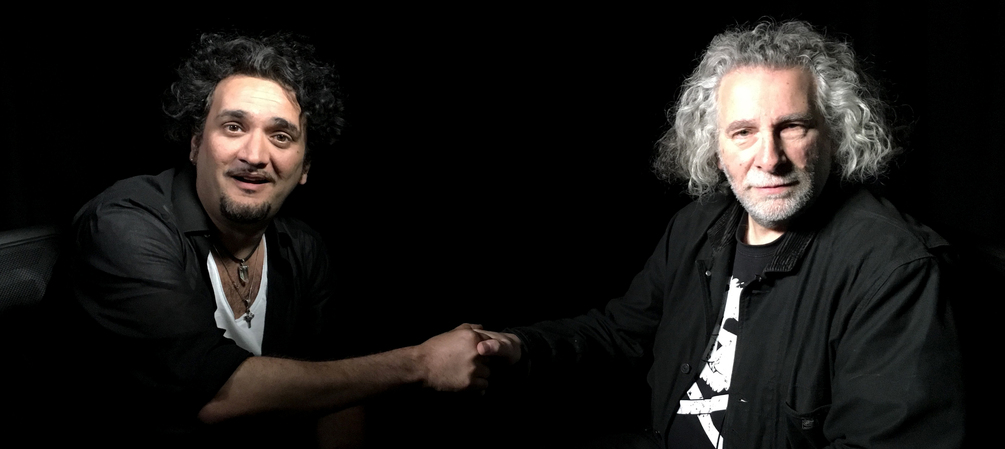
How did Kevin Godley assist during the writing process of Super Connected?
Kevin and I became really close when we made a film together about Soho in 2015, about the campaign I had been running. I’ve learnt a lot from him over the years and although he’s way too cool to ever want to be someone’s mentor, I feel very much mentored by him.
I wrote Super Connected as a suite of songs with corresponding film scenes for each song.
Kevin Godley is possibly one of the greatest artists when it comes to working with those two mediums at once. We spent incredible nights on the phone together discussing the topics I was writing about and how I wanted to visualise them. He pushed me to be braver with my choices. Both musically and visually.
Kevin, and other artists of his generation understand my drive. That’s been really important for me as someone who mostly works alone. We all need a sounding board. He’s been a dear friend.
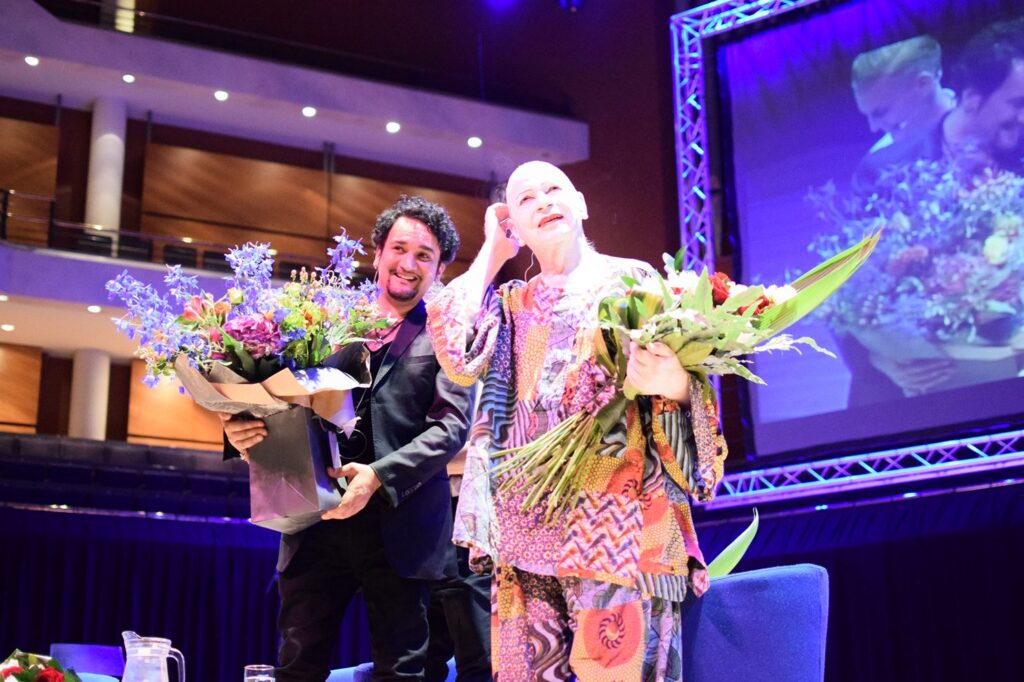
How did Lindsay Kemp contribute to the album’s creation?
I think Lindsay Kemp contributed to Super Connected by dancing into my life and making me have to pause my plans for the album! When someone like Lindsay wants to collaborate with you, you have to say yes. And that meant making the choice to halt my plans for Super Connected in 2018. His biggest contribution was magically working with the inner magic of the project.
The pre-production for the album was also heavily boosted by Lindsay’s support for me. I haven’t found the music industry to be a very friendly landscape in my career. That has historically been quite painful for me.
But people like Lindsay, Kevin and Stephen made me feel like I could and should carry on. They give time to fully understand what I create. I’m so lucky to have had their encouragement and support.
We understand that you wrote each song from the perspective of different people, each with a unique mental disorder. How did you research and prepare for these different perspectives?
I think from what I know of the actors I’ve met, one imagines what it feels like to be the character you’re portraying. That’s what I did. And I tried to find out what part of that character resonated with my own way of being. It also helped that I have had my own history of addiction. Addiction runs through several of the characters in Super Connected.
As Gabor Mate says, addiction is not about the substance, it’s about the addict. I transferred 25 years of being a recovering addict onto tech addiction for Super Connected.
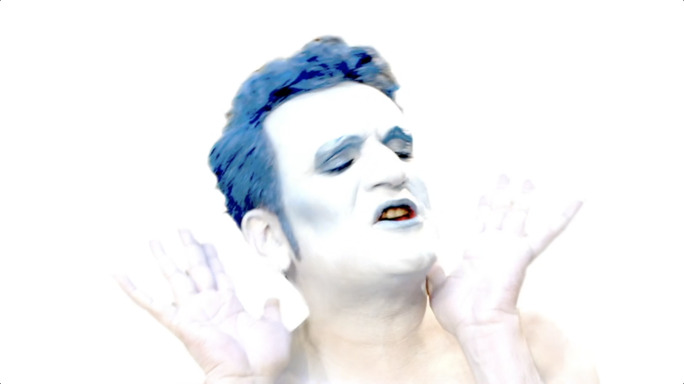
How important was it for you to address the issue of tech addiction, consumerism, and compassion for those affected by screen dependency in your album?
It’s always important for me to address a topic in a song when I’ve noticed no other writers are covering. After my albums ‘I Am For You’ and ‘You Are For Me’, I wanted to write about others again. Like I had done on ‘The Soho Hobo’. I tend to swing between personal songs and social commentary from album to album. But ironically, with Super Connected, writing about others resulted in me writing the most personal songs I’ve ever written.
I wanted someone to write an album about this material. And nobody was. Charlie Brooker was doing it with Black Mirror. Douglas Rushkoff was doing it with Team Human. But there were not any musicians covering the topic, at least not in an antagonistic way that could (and has) upset some of the tech giants. Pink Floyd and Bowie would have conceptualised this into albums if we were still in the 70s. With Super Connected, I made the album that I wish they would or could have done.
What was the reasoning behind the creation of a feature-length film of the album before releasing the album itself?
I grew up in that culture when it was normal for us to stop what we were doing and give full attention to an album from start to end. The album ritual. It’s what made me want to make records when I built my first multi-track recorder at the age of 12. Full attention.
Nowadays, we give full attention to an hour of drama on Netflix. With Super Connected, I made a screen album to give people the choice to explore the album through sound, vision or both.
We’ve heard that the album launch at the Roundhouse in May is a phone-free event. Could you explain how that works and what the reasoning is behind it?
Super Connected LIVE is an art ritual theatre experiment with live music and film. That doesn’t mean it’s better or worse than any other kind of show. It’s just different. For the live immersive show of Super Connected, I am on stage performing the songs with pianist and performance artist Sarah Kershaw. But we are both in relationship with the film, and the film is like another character on stage. It’s not a traditional live music ‘gig’.
Finding a way to live without phones for the duration of the show was simply in realising that it’s not easy to get the full experience if you’re not fully immersed. Speaking for myself, when I have my phone switched on and, in my pocket, I am not even fully immersed in what someone is saying to me. We really want people to get the full value when they get a ticket.
I began going to concerts in the 90s, so I have a strong memory as a punter what it was like to go to, say, a Radiohead show when no one had a mobile phone, between you and the band. My generation are lucky to have had that last moment of truly being embodied in an experience.
But if you’re a digital native, under the age of 25, the experience without a phone is like nothing else on earth. The younger people who have been part of the production rehearsals already have been moved to tears, elated and spirits lifted. Because we’re daring to imagine what entertainment feels like without a phone connection.
I’m so grateful to Yondr for coming up with their pouches. It doesn’t have to be the norm, but it gives performers and venues more choices. Also, as someone on the autistic spectrum, I now know why I have had severe mental difficulties in the past due to extraneous noises in music venues. Auditory overload can make performing an unbearable experience for me if I hear anything other than the music I’m performing. That’s why we’re doing it in a theatre space, and that’s also why phones aren’t permitted in that space.
It’s not a restriction for the audience. It’s an enhancement. And it only lasts a little over an hour. I’ll do other shows when it doesn’t matter if the audience have their phone. But, with Super Connected, there is a lot happening on stage, and some of it is concealed at first (for a reason). If you’re checking your bank balance or the football results on your phone, you will definitely miss something that will take away from the experience. Kate and I have worked meticulously to give the audience a moving and surprising night out. We just want to deliver that.
Who is the character depicted on the album cover and how does this character tie in with the themes explored on the album?
Well, it’s the Trojan Horse of Big Tech. And it’s what a Trojan Horse for Big Tech looks like when it’s targeted at a musician. In some of the well-known stories about Aliens (Spielberg’s ‘’Taken and Jodie Foster’s ‘Contact’ for example), it’s common for Aliens to make themselves look like something that we will feel drawn to, in order to make relations possible.
If you were going to target a depressed musician who has lost touch with his relationship to music in order to take the ingredients of his soul away, then it might be effective to present yourself like…a fantasy pop star with blue hair. The character is one of the roles I am playing in the film.
It’s also a dedication to Lindsay Kemp as the man who arguably inspired Bowie’s first alter-ego and subsequently the entire New Romantic face-painted brigade in the 1980’s.
How did you first get started in the music industry – what were some of the challenges you have faced early on, and then what have they been latterly in your music journey?
I got started in the industry by mistakenly being identified by Sony Music as a pop star in 1995. I believed them and signed a record deal. Only when they dropped me did I realised that I am in fact, a writer and performance artist. The challenges I faced early on were not knowing I was autistic, not acknowledging I was mixed race, not realising that coming from a gay family was different, and not noticing systemic racism in the music industry. I’m a little more self-aware now. The advantages of never being with a record label mean I have created the work that wanted itself to become manifest. I feel I served as a good conduit for the art without the industry getting in the way.
You’ve collaborated with a number of other artists over the years. What have been some of your favourite collaborations, and how have these experiences influenced your approach to music?
I’ve talked about some of my collaborations earlier. But at the moment, working with an actor, theatre director and unique artist like Kate Alderton has inspired me to see my music as a tool for self-growth and healing, and practicing that in front of an audience. She’s a genius.
Finally, what do you hope listeners will take away from your album – is there a message or a particular feeling you want to convey?
I really hope people listen to the songs and enjoy listening…or singing… or humming along. Creating expansive concepts for my albums are kind of rooted in the teachings of my art teacher at school, June Mehra. She taught me to build preliminary sketches before moving onto a finished piece. She encouraged me to build the world before I began planting seeds to grow trees.
The world building is vital to me. But when it comes to others, I’m just happy for them to pick a fruit from the tree. And I hope my listeners come to the Roundhouse on the 12th May because it’s going to be a beautiful ritual.
Further information
Tim Arnold, Super Connected Live at The Roundhouse, Friday 12 May
